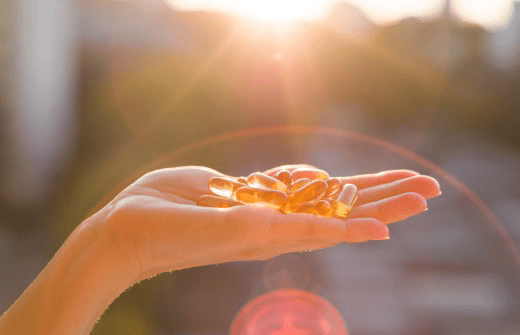Testosteron to najważniejszy męski hormon. Jest ważnym regulatorem wielu funkcji organizmu, zarówno męskiego, jak i żeńskiego, chociaż mężczyźni zazwyczaj produkują go około 10 razy więcej dziennie niż kobiety. Wraz z wiekiem poziom testosteronu u mężczyzn zaczyna spadać średnio o 1% rocznie od trzydziestki. Jak możemy pomóc utrzymać zdrowy poziom testosteronu? Wyjaśnimy to w poniższym artykule.
Krótki przegląd artykułu:
- Gdzie produkowany jest testosteron?
- Z czego pochodzi testosteron?
- Co jeszcze wpływa na równowagę hormonalną?
- Dlaczego mężczyźni chcą zwiększyć poziom testosteronu?
- Podstawowe metody naturalnego zwiększania testosteronu
- Wypróbuj zioła, aby zwiększyć poziom testosteronu
Gdzie produkowany jest testosteron?
U mężczyzn testosteron jest syntetyzowany głównie w komórkach Leydiga w jądrach oraz, w mniejszym stopniu, w komórkach nadnerczy. Natomiast u kobiet produkcja testosteronu odbywa się głównie w jajnikach , a mniejsza jego ilość jest syntetyzowana w korze nadnerczy. Niedostateczna produkcja testosteronu może prowadzić do przewlekłych schorzeń nerek, wątroby i układu rozrodczego. Należy bezwzględnie unikać niepotrzebnego przeciążania tych narządów , na przykład poprzez spożywanie nieodpowiednich pokarmów lub nadmierne spożycie alkoholu .
Z czego pochodzi testosteron?
Hormony płciowe są syntetyzowane z cholesterolu , który jest głównym substratem hormonów steroidowych. Nasz organizm potrzebuje cholesterolu do wykonywania ważnych funkcji, a odpowiednia proporcja tłuszczów w diecie odgrywa w tym dużą rolę. Olej kokosowy, oliwa z oliwek, awokado, pestki i tłuste ryby to dobre źródła składników odżywczych.
Co jeszcze wpływa na równowagę hormonalną?
Kategoria cząsteczek znanych jako substancje zaburzające gospodarkę hormonalną obejmuje substancje o uderzającym podobieństwie chemicznym do hormonów steroidowych. Naśladując i blokując naturalne funkcje hormonalne organizmu, mogą one blokować receptory lub w inny sposób zaburzać funkcjonowanie układu hormonalnego, co prowadzi do szeregu powikłań zdrowotnych.
Te substancje zaburzające mogą występować w postaci substancji naturalnych , gdzie związki takie jak estrogeny lub fitoestrogeny neutralizują testosteron, lub substancji syntetycznych, takich jak pestycydy, plastyfikatory i substancje chemiczne powszechnie występujące w kosmetykach i środkach czyszczących . Warto zatem dokładnie przyjrzeć się składowi aktualnie stosowanych produktów do pielęgnacji ciała, niezależnie od tego, czy są to dezodoranty, czy kremy.
Dlaczego mężczyźni chcą zwiększyć poziom testosteronu?
Wraz z wiekiem poziom testosteronu naturalnie spada u mężczyzn , zazwyczaj rozpoczynając się około trzydziestego roku życia i najczęściej prowadząc do niedoborów po pięćdziesiątce. Spadek ten objawia się na różne sposoby: zmniejszeniem masy mięśniowej i gęstości kości, spadkiem poziomu energii, spadkiem libido i zdolności reprodukcyjnych oraz zaburzeniami metabolizmu tłuszczów. Badania często przypisują te zmiany współczesnemu stylowi życia charakteryzującemu się zmniejszoną aktywnością fizyczną , siedzącym trybem życia, nieodpowiednimi wyborami żywieniowymi, zanieczyszczeniami środowiska oraz narażeniem na szkodliwe substancje zawarte w produktach codziennego użytku, takich jak kosmetyki, środki czyszczące i plastikowe opakowania.
Każdy dzień daje nam okazję do proaktywnego podejmowania decyzji: wybierania pożywnych produktów spożywczych , unikania szkodliwych substancji, podejmowania aktywności fizycznej i przyjmowania strategii radzenia sobie ze stresorami psychologicznymi współczesnego życia.
Podstawowe metody naturalnego zwiększania testosteronu
W dążeniu do naturalnego zwiększenia poziomu testosteronu wyróżnia się trzy podstawowe obszary : ćwiczenia, nawyki żywieniowe i suplementy , a także odpowiednią ilość odpoczynku dla organizmu .
-
Ćwiczenia
Krótkie, intensywne treningi wykazały znaczną skuteczność w podnoszeniu poziomu testosteronu. Szczególnie korzystny jest trening interwałowy o wysokiej intensywności (HIIT) oraz ćwiczenia złożone angażujące wiele grup mięśniowych jednocześnie (np. przysiady, podciąganie na drążku, martwy ciąg). Ćwiczenia te odzwierciedlają zasady treningu funkcjonalnego, wykorzystując dynamiczne, złożone ruchy zgodne z ewolucyjnymi wzorcami człowieka, takie jak pchanie, ciągnięcie, zginanie, przysiady i rotacje. Z kolei siedzący tryb życia , taki jak długotrwała jazda samochodem, oferuje minimalne korzyści w zakresie podnoszenia poziomu testosteronu .
- Odpoczynek, sen i zarządzanie stresem
Priorytetem jest zapewnienie odpowiedniej ilości snu, ponieważ znaczna część produkcji testosteronu u mężczyzn zachodzi podczas głębokiego snu nocnego . Osoby z zaburzeniami snu, takie jak pracoholicy czy pracownicy zmianowi, są narażone na niedobory testosteronu. Ustalenie zdrowych nawyków związanych ze snem i optymalizacja rytmów dobowych są kluczowe .
Dodatkowo, włączenie przerw na odpoczynek w okresach wzmożonego napięcia pomaga złagodzić stres, ponieważ długotrwały stres podnosi poziom kortyzolu, hamując syntezę testosteronu . Proste techniki relaksacyjne, takie jak krótka medytacja lub ćwiczenia głębokiego oddychania, mogą sprzyjać wyciszeniu w ciągu dnia. Pozwól swojemu ciału i umysłowi wyciszyć się w ciągu dnia – wystarczy zrobić krótkie przerwy na medytację lub wziąć 3 relaksujące oddechy .
- Nawyki żywieniowe i kontrola masy ciała
Spożywanie cukru i wysoko przetworzonej żywności negatywnie wpływa na poziom testosteronu , przyczyniając się do otyłości i promując aromatyzację tkanki tłuszczowej do estrogenu, co dodatkowo hamuje produkcję testosteronu.
Z kolei utrzymanie zbilansowanej diety bogatej w białka, zdrowe tłuszcze i produkty pełnoziarniste wspomaga syntezę testosteronu. Dowody naukowe potwierdzają również wpływ witaminy D, cynku i boru na poziom testosteronu .
Bor , w szczególności, okazał się kluczowym pierwiastkiem w zwiększaniu poziomu wolnego testosteronu – biologicznie aktywnej formy niezbędnej do funkcjonowania komórek. Chociaż większość testosteronu wiąże się z białkami we krwi, tylko jego ułamek występuje w stanie wolnym, łatwo dostępnym do wykorzystania przez komórki. Priorytetowe traktowanie optymalizacji poziomu wolnego testosteronu okazuje się kluczowe dla utrzymania ogólnej równowagi testosteronu i funkcji fizjologicznych.
Wypróbuj zioła, aby zwiększyć poziom testosteronu
Istnieją związki przypominające męskie hormony płciowe, które wpływają na metabolizm tłuszczów i wspierają naturalną produkcję testosteronu , takie jak niektóre zioła . Na przykład buzdyganek naziemny (Tribulus terrestris) zawiera te bioaktywne związki, które mogą zwiększać masę i siłę mięśni poprzez wykorzystanie cholesterolu do podniesienia poziomu testosteronu. Ten mechanizm może wyjaśniać jego reputację jako afrodyzjaku, atrakcyjnego dla obu płci.
Podobnie, pokrzywa zwyczajna ( Urtica dioica ) to kolejne zioło, które może zwiększać poziom wolnego testosteronu , wywierając tym samym znaczące działanie anaboliczne. Związki zawarte głównie w jej korzeniu hamują wiązanie 5-alfa-dihydrotestosteronu, co czyni pokrzywę doskonałym środkiem wspomagającym leczenie przerostu prostaty .





















